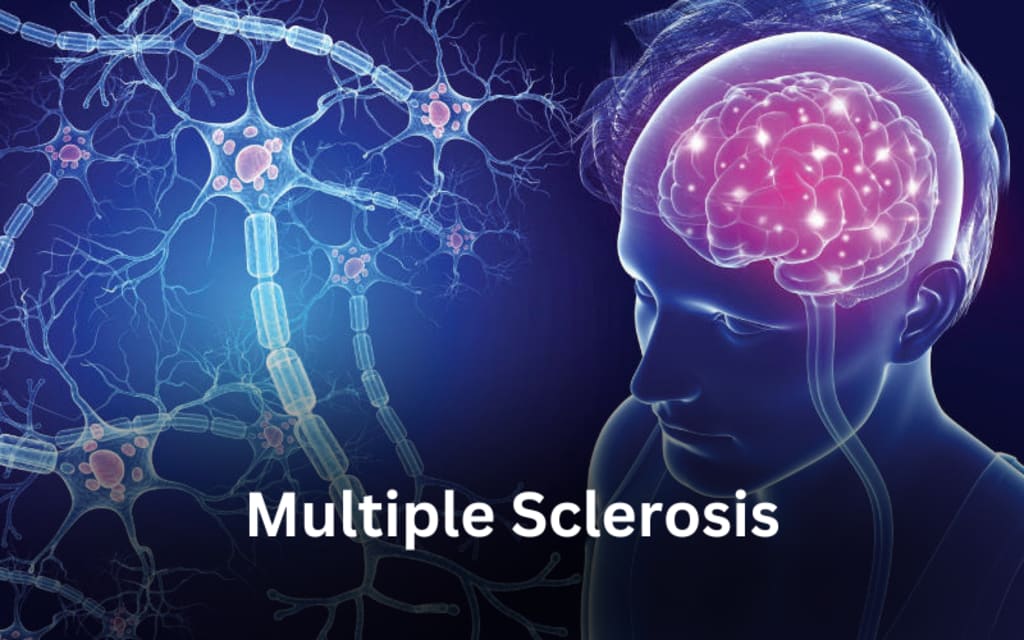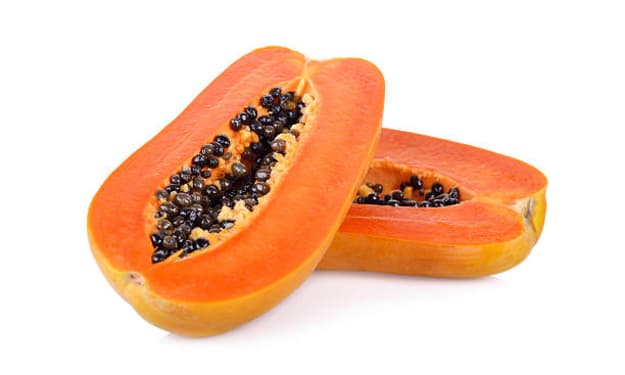A Deep Dive into Multiple Sclerosis: Uncovering Symptoms, Causes, Diagnosis, Types, and Complications
A Roadmap from Symptoms to Complications

Multiple sclerosis (MS) is an autoimmune disease. In these diseases, your immune system hits healthy cells by accident. People with MS have an immune system that attacks cells in the myelin, which is a protective covering for nerves in the brain and spinal cord.
When the myelin sheath gets damaged, nerve messages from the brain to other parts of the body get messed up. Damage to your brain, spinal cord, or eyes can make you feel sick.
Symptoms
- Weakness
- Tiredness
- Constipation
- Difficult speaking
- Difficult swallowing
- Loss of balance
- Pain in the Nerve
- Repeated facial palsy
- Vision problems
- Vision loss
Types
The most common kinds of MS are:
- Relapsing-Remitting MS: is the most common type. About 85% of people with MS have this type; It has periods of new or worsening symptoms followed by periods when some or all of the symptoms go away.
- Primary Progressive MS: About 10–15 percent of MS patients have PPMS. Symptoms get steadily worse from the start, without any clear relapses or remissions.
- Secondary progressive multiple sclerosis: Some people with RRMS can change to SPMS.gets worse over time, with or without relapses.
- Progressive-Relapsing MS : This is the rarest type and only a few people with MS have it. Symptoms get steadily worse over time, and clear acute relapses happen without long healing periods.
Causes
A number of things cause multiple sclerosis,
- Genetics
- Infections
- Smoking
- Drinking alcohol
- Surroundings, and mental stress
Risk Factors
- Age: Most people get it between 20 and 40, but it can happen at any age
- Family history: If a parent or child has had MS, your risk goes up
- Gender: Relapsing-remitting MS is more common in women
- Certain infections: have been linked to MS
- Climate: common in countries with mild weather
- Vitamin D: Low amounts of vitamin D and not getting enough sun puts you at a higher risk
- Smoking: People with the first signs of MS who smoke are more likely to get
- You are more likely to get certain autoimmune illnesses if you have other autoimmune diseases
Diagnosis
- Clinical evaluation: A thorough look at symptoms, medical background, and how the nervous system works to find patterns consistent with MS.
- Blood tests: are used to rule out other diseases that cause similar symptoms and to look for biomarkers linked to MS.
- MRI: lets doctors see the brain and spinal cord to look for tumors or inflamed areas that MS could cause.
- Lumbar puncture(spinal tap): is a technique to collect and test cerebrospinal fluid for specific markers, like antibodies, that may be signs of MS.
Complications
- Mobility and Walking Problems: coordination, balance, muscle weakness, and stiffness, all of which can make it hard to walk
- Tiredness: have a big effect on daily life and quality of life.
- Bladder and Bowel Dysfunction: urgent or frequent urination, incontinence, and constipation.
- Changes in the brain: have problems with their memory, attention, ability to solve problems, and ability to handle information.
- Depression and Changes in Emotions: leading to more depression, anxiety, mood swings, and changes in emotions.
- Pain: caused by problems with movement and muscle strain.
- Vision Problems: blurry vision, eye pain, and even temporary or lasting vision loss.
- Muscle cramps and Spasticity: uncontrollable muscle cramps, stiffness, and Spasticity, which makes it hard to move and control muscles.
According to Ayurveda, multiple sclerosis is caused by a problem with the body's energy. When the basic principles, called dosha, are changed, it can lead to a number of signs. When the balance of the body's systems is upset, it can make processing hard and cause toxins to form and build up in the body. When toxins build up in the body, they block the tiny channels and stop the flow of body energies, which can lead to neuromuscular diseases. If these blockages aren't handled, they can be fatal and cause nerve and tissue damage that can't be fixed.
Ayurvedic treatment for multiple sclerosis is Langhana therapy. The therapy focuses on getting rid of the buildup of ama and pitta or Kapha doshas. Panchakarma is a cleansing method that is part of Ayurvedic medicine for MS. Shamana therapy, on the other hand, it is used for a longer time to heal the sickness. The patient's physical condition, health history, and other factors would be used to decide the type and length of treatment. The Ayurveda doctor will only come up with a treatment plan after he or she has looked at the patient in detail.
- Abhyanga: is when warm oil that has been infused with herbs is used to massage the body.
- Njavarakizhi: is a massage with a bag of special rice called Njavara.
- Pizhichil: warm medicinal oil is poured over the body and rubbed.
- Siro Dhara: therapeutic oil is poured over your head.
Since it is a disease that gets worse over time, you should avoid foods that are acidic, high in saturated fat, high in trans fat, high in salt, high in refined sugar, full-fat dairy, etc.
Eat dry food, eat less food, spend too much time in the wind, sun, or heat, stay up late at night, or feel anger, fear, grief, or sorrow. Avoid eating foods that don't go well together, self-medicating with food at the wrong time, and using medicines like painkillers, anti-inflammatory drugs, sleeping pills, etc., on a regular basis.
Eat food that is easy to process, alkaline, fresh, has all six rasas, is in season, is eaten at the right time, is high in vitamin D, keeps the body hydrated, keeps the mind calm, relaxed, and free from worries, eat more antioxidant-rich fruits, green vegetables, etc.
About the Creator
Enjoyed the story? Support the Creator.
Subscribe for free to receive all their stories in your feed. You could also pledge your support or give them a one-off tip, letting them know you appreciate their work.





Comments
There are no comments for this story
Be the first to respond and start the conversation.